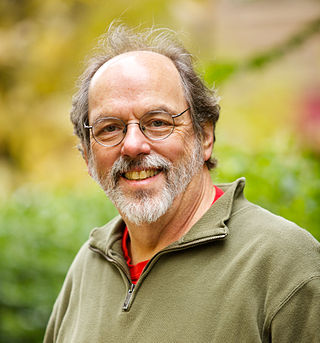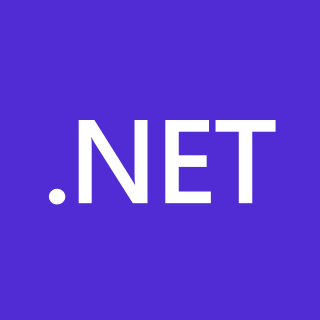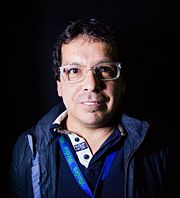SourceForge is a web service that offers software consumers a centralized online location to control and manage open-source software projects and research business software. It provides source code repository hosting, bug tracking, mirroring of downloads for load balancing, a wiki for documentation, developer and user mailing lists, user-support forums, user-written reviews and ratings, a news bulletin, micro-blog for publishing project updates, and other features.
Ximian, Inc. was an American company that developed, sold and supported application software for Linux and Unix based on the GNOME platform. It was founded by Miguel de Icaza and Nat Friedman in 1999 and was bought by Novell in 2003. Novell continued to develop Ximian's original products, while adding support for its own GroupWise and ZENworks software.

Ian Clarke is the original designer and lead developer of Freenet.

Free Software Foundation (FSF) grants two annual awards. Since 1998, FSF has granted the award for Advancement of Free Software and since 2005, also the Free Software Award for Projects of Social Benefit.

Paint.net is a freeware raster graphics editor program for Microsoft Windows, developed on the .NET Framework. Paint.net was originally created by Rick Brewster as a Washington State University student project, and has evolved from a simple replacement for the Microsoft Paint program into a program for editing mainly graphics, with support for plugins.

In computing, a news aggregator, also termed a feed aggregator, feed reader, news reader, RSS reader or simply an aggregator, is client software or a web application that aggregates syndicated web content such as online newspapers, blogs, podcasts, and video blogs (vlogs) in one location for easy viewing. The updates distributed may include journal tables of contents, podcasts, videos, and news items.

Extended Copy Protection (XCP) is a software package developed by the British company First 4 Internet and sold as a copy protection or digital rights management (DRM) scheme for Compact Discs. It was used on some CDs distributed by Sony BMG and sparked the 2005 Sony BMG CD copy protection scandal; in that context it is also known as the Sony rootkit.
Free Download Manager is a download manager for Windows, macOS, Linux and Android.

Minimig is an open source re-implementation of an Amiga 500 using a field-programmable gate array (FPGA).
Google Developers is Google's site for software development tools and platforms, application programming interfaces (APIs), and technical resources. The site contains documentation on using Google developer tools and APIs—including discussion groups and blogs for developers using Google's developer products.

Black Duck Open Hub, formerly Ohloh, is a website which provides a web services suite and online community platform that aims to index the open-source software development community. It was founded by former Microsoft managers Jason Allen and Scott Collison in 2004 and joined by the developer Robin Luckey. As of 15 January 2016, the site lists 669,601 open-source projects, 681,345 source control repositories, 3,848,524 contributors and 31,688,426,179 lines of code.

Silverstripe CMS is a free and open source content management system (CMS) and framework for creating and maintaining websites and web applications. It provides an out of the box web-based administration panel that enables users to make modifications to parts of the website, which includes a WYSIWYG website editor. The core of the software is Silverstripe Framework, a PHP Web application framework.

In the 1950s and 1960s, computer operating software and compilers were delivered as a part of hardware purchases without separate fees. At the time, source code, the human-readable form of software, was generally distributed with the software providing the ability to fix bugs or add new functions. Universities were early adopters of computing technology. Many of the modifications developed by universities were openly shared, in keeping with the academic principles of sharing knowledge, and organizations sprung up to facilitate sharing. As large-scale operating systems matured, fewer organizations allowed modifications to the operating software, and eventually such operating systems were closed to modification. However, utilities and other added-function applications are still shared and new organizations have been formed to promote the sharing of software.

CCleaner, developed by Piriform Software, is a utility used to clean potentially unwanted files and invalid Windows Registry entries from a computer. It is one of the longest-established system cleaners, first launched in 2004. It was originally developed for Microsoft Windows only, but in 2012, a macOS version was released. An Android version was released in 2014.

The history of wikis began in 1994, when Ward Cunningham gave the name "WikiWikiWeb" to the knowledge base, which ran on his company's website at c2.com, and the wiki software that powered it. The wiki went public in March 1995, the date used in anniversary celebrations of the wiki's origins. c2.com is thus the first true wiki, or a website with pages and links that can be easily edited via the browser, with a reliable version history for each page. He chose "WikiWikiWeb" as the name based on his memories of the "Wiki Wiki Shuttle" at Honolulu International Airport, and because "wiki" is the Hawaiian word for "quick".
Proprietary software is software that is deemed within the free and open-source software to be non-free because its creator, publisher, or other rightsholder or rightsholder partner exercises a legal monopoly afforded by modern copyright and intellectual property law to exclude the recipient from freely sharing the software or modifying it, and—in some cases, as is the case with some patent-encumbered and EULA-bound software—from making use of the software on their own, thereby restricting his or her freedoms. It is often contrasted with open-source or free software. For this reason, it is also known as non-free software or closed-source software.

A controversy surrounding the AACS cryptographic key arose in April 2007 when the Motion Picture Association of America and the Advanced Access Content System Licensing Administrator, LLC began issuing cease and desist letters to websites publishing a 128-bit (16-byte) number, represented in hexadecimal as 09 F9 11 02 9D 74 E3 5B D8 41 56 C5 63 56 88 C0, a cryptographic key for HD DVDs and Blu-ray Discs. The letters demanded the immediate removal of the key and any links to it, citing the anti-circumvention provisions of the United States Digital Millennium Copyright Act (DMCA).

The .NET Framework is a proprietary software framework developed by Microsoft that runs primarily on Microsoft Windows. It was the predominant implementation of the Common Language Infrastructure (CLI) until being superseded by the cross-platform .NET project. It includes a large class library called Framework Class Library (FCL) and provides language interoperability across several programming languages. Programs written for .NET Framework execute in a software environment named the Common Language Runtime (CLR). The CLR is an application virtual machine that provides services such as security, memory management, and exception handling. As such, computer code written using .NET Framework is called "managed code". FCL and CLR together constitute the .NET Framework.

Menéame is a Spanish social news website based on community participation, made for users to discover and share content on the Internet, by submitting links, which are voted and commented upon. Its model is based on Digg and it combines social bookmarking, blogging and Web syndication with a publication system without editors.

Kune is a free/open source distributed social network focused on collaboration rather than just on communication. That is, it focuses on online real-time collaborative editing, decentralized social networking and web publishing, while focusing on workgroups rather than just on individuals. It aims to allow for the creation of online spaces for collaborative work where organizations and individuals can build projects online, coordinate common agendas, set up virtual meetings, publish on the web, and join organizations with similar interests. It has a special focus on Free Culture and social movements needs. Kune is a project of the Comunes Collective.














